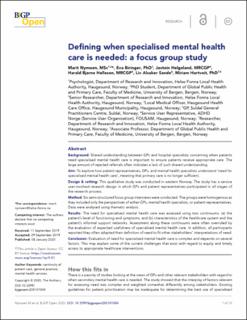| dc.contributor.author | Nymoen, Marit | |
| dc.contributor.author | Biringer, Eva Aaker | |
| dc.contributor.author | Helgeland, Jostein | |
| dc.contributor.author | Hellesen, Harald Bjarne | |
| dc.contributor.author | Sande, Liv Alsaker | |
| dc.contributor.author | Hartveit, Miriam | |
| dc.date.accessioned | 2021-07-14T13:01:26Z | |
| dc.date.available | 2021-07-14T13:01:26Z | |
| dc.date.created | 2021-02-21T19:50:34Z | |
| dc.date.issued | 2020 | |
| dc.identifier.issn | 2398-3795 | |
| dc.identifier.uri | https://hdl.handle.net/11250/2764437 | |
| dc.description.abstract | Background: Shared understanding between GPs and hospital specialists concerning when patients need specialised mental health care is important to ensure patients receive appropriate care. The large amount of rejected referrals often indicates a lack of such shared understanding.
Aim: To explore how patient representatives, GPs, and mental health specialists understand ‘need for specialised mental health care’, meaning that primary care is no longer sufficient.
Design & setting: This qualitative study was conducted in western Norway. The study has a service user-involved research design in which GPs and patient representatives participated in all stages of the research process.
Method: Six semi-structured focus group interviews were conducted. The groups were homogenous as they included only the perspectives of either GPs, mental health specialists, or patient representatives. Data were analysed using thematic analysis.
Results: The need for specialised mental health care was assessed using two continuums: (a) the patient’s level of functioning and symptoms; and (b) characteristics of the healthcare system and the patient’s informal support networks. Assessment along these continuums were often overruled by the evaluation of expected usefulness of specialised mental health care. In addition, all participants reported they often adapted their definition of need to fit other stakeholders’ interpretations of need.
Conclusion: Evaluation of need for specialised mental health care is complex and depends on several factors. This may explain some of the current challenges that exist with regard to equity and timely access to appropriate healthcare interventions. | en_US |
| dc.language.iso | eng | en_US |
| dc.publisher | Royal College of General Practitioners | en_US |
| dc.rights | Navngivelse 4.0 Internasjonal | * |
| dc.rights.uri | http://creativecommons.org/licenses/by/4.0/deed.no | * |
| dc.title | Defining when specialised mental health care is needed: A focus group study | en_US |
| dc.type | Journal article | en_US |
| dc.type | Peer reviewed | en_US |
| dc.description.version | publishedVersion | en_US |
| dc.rights.holder | Copyright 2020 the authors | en_US |
| dc.source.articlenumber | bjgpopen20X101004 | en_US |
| cristin.ispublished | true | |
| cristin.fulltext | original | |
| cristin.qualitycode | 1 | |
| dc.identifier.doi | 10.3399/bjgpopen20X101004 | |
| dc.identifier.cristin | 1892135 | |
| dc.source.journal | British Journal of General Practice Open | en_US |
| dc.identifier.citation | British Journal of General Practice Open. 2020, 4 (1), bjgpopen20X101004. | en_US |
| dc.source.volume | 4 | en_US |
| dc.source.issue | 1 | en_US |

